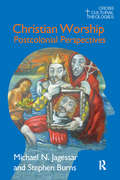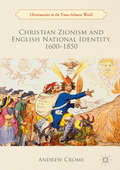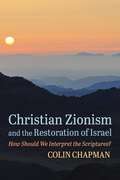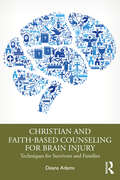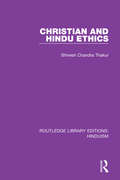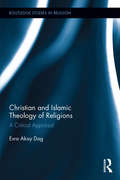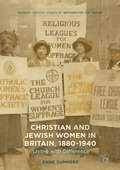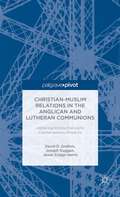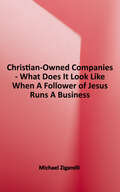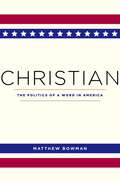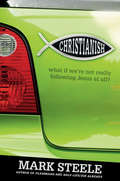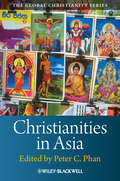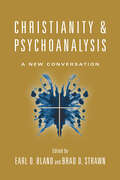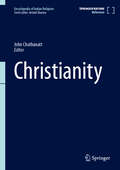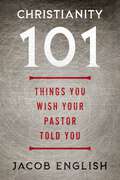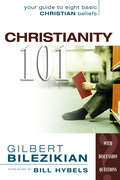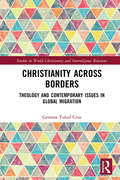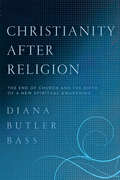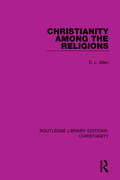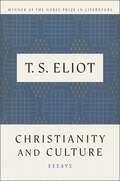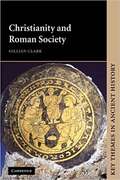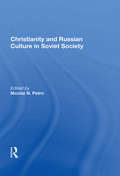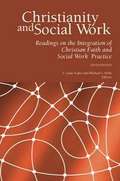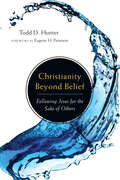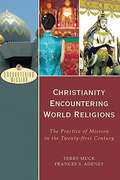- Table View
- List View
Christian Worship: Postcolonial Perspectives (Cross Cultural Theologies Ser.)
by Stephen Burns Michael N. JagessarPostcolonialism has greatly influenced biblical and theological criticism but has not yet entered the realm of church worship and practice. 'Christian Worship' brings the insights of postcolonial thinking to the rituals of religious life. The book critically analyses liturgical theology through the lens of postcolonialism and explores the challenges of appropriating postcolonial perspectives in Christian worship. Ranging from liturgical texts and song to Scripture, lectionaries, festivals and sacraments, this volume offers a fresh approach to liturgy that will be of interest to students of theology, seminarians and church practitioners.
Christian Zionism and English National Identity, 1600–1850 (Christianities in the Trans-Atlantic World)
by Andrew CromeThis book explores why English Christians, from the early modern period onwards, believed that their nation had a special mission to restore the Jews to Palestine. It examines English support for Jewish restoration from the Whitehall Conference in 1655 through to public debates on the Jerusalem Bishopric in 1841. Rather than claiming to replace Israel as God’s “elect nation”, England was “chosen” to have a special, but inferior, relationship with the Jews. Believing that God “blessed those who bless” the Jewish people, this national role allowed England to atone for ill-treatment of Jews, read the confusing pathways of providence, and guarantee the nation’s survival until Christ’s return. This book analyses this mode of national identity construction and its implications for understanding Christian views of Jews, the self, and “the other”. It offers a new understanding of national election, and of the relationship between apocalyptic prophecy and political action.
Christian Zionism and the Restoration of Israel: How Should We Interpret the Scriptures?
by Colin ChapmanHow should Christians today understand the many promises and prophecies in the Old Testament about the future of Israel and its land? Are Christian Zionists justified in believing that these have been fulfilled in the return of Jews to their land since the 1880s and the creation of the State of Israel in 1948? This book discusses all the key texts about the restoration of Israel that are quoted in these debates, questioning the Christian Zionist interpretation and offering an alternative. This is followed by a detailed study of two important Old Testament texts dealing with the future of Israel, Ezekiel 33-47 and Zechariah 9-13, understanding them in their original context and exploring how they are interpreted in the New Testament. This is no theoretical, ivory-tower debate. We are dealing here with the most bitter and protracted conflict of the last 150 years; and the way we interpret the Bible has profound political consequences.
Christian and Faith-based Counseling for Brain Injury: Techniques for Survivors and Families
by Deana AdamsChristian and Faith-based Counseling for Brain Injury is the first book of its kind to offer faith-based therapy to address the emotional, cognitive, and mental health needs of individuals who have suffered a traumatic brain injury (TBI). A highly researched piece of work, the book puts forth an innovative and effective method for not only addressing the challenges of a life-changing injury but also for creating a sense of purpose. Through the nuances of faith-based counselling, this book focuses on the spiritual and existential aspects of understanding the diagnosis and creating a purpose post-injury. It examines how brain injury can affect an individual by exploring the deficits of brain injury, the impact of brain injury, and the challenges specific to damage to certain brain lobes. It also describes the mental health issues, such as depression, anxiety, grief, anger, and posttraumatic stress, that can affect both the survivor and their family members. Offering targeted counseling techniques and adaptive strategies, it shows how faith-based counselors can effectively treat brain injury. This book is valuable reading for all individuals invested in providing support to the TBI community. It is aimed at counselors, lay counselors, healthcare professionals, social workers, psychotherapists, seminary students, and upper-level graduate students. It will further be of use to for clinicians working in the outpatient level of care and private practice settings.
Christian and Hindu Ethics (Routledge Library Editions: Hinduism #1)
by Shivesh Chandra ThakurHinduism and Christianity are different in structure and approach – but have a great deal in common in matters relating to ethics. This book, first published in 1969, is the first systematic and detailed work which attempts to bring out both the differences and similarities. The author selects some of the fundamental problems of philosophical ethics, such as the moral law – its authority and sources, moral effort and human freedom, moral failure and responsibility – and explores the respective answers of Hinduism and Christianity.
Christian and Islamic Theology of Religions: A Critical Appraisal (Routledge Studies in Religion)
by Esra Akay DagTheologians have had to increasingly engage with beliefs and practises outside of their own traditions. The resultant "theology of religions" is, however, often formulated in isolation from the religions they are describing. This book provides a comparison of the development of theology of religions in Western Christianity and its application in anIslamic context. It also shows the parallels between some specific forms of theology of religions, i.e. exclusivism, inclusivism or pluralism, in both Islamic and Christian traditions. The arguments of Christian and Muslim theologians, including the specific contributions of Rowan Williams and Jerusha Lamptey, are examined in order to reveal the interconnections and contradictions of their pluralist, exclusivist and inclusivist approaches. This provides a rounded picture of Christian-Muslim understanding of religious others and prepares the ground for a stronger and more sophisticated Islamic theology of religions. This is vital reading for those studying theology of religions, comparative theology and interfaith relations.
Christian and Jewish Women in Britain, 1880-1940: Living with Difference (Palgrave Critical Studies of Antisemitism and Racism)
by Anne SummersThis book offers an entirely new contribution to the history of multiculturalism in Britain, 1880-1940. It shows how friendship and co-operation between Christian and Jewish women changed lives and, as the Second World War approached, actually saved them. The networks and relationships explored include the thousand-plus women from every district in Manchester who combined to send a letter of sympathy to the Frenchwoman at the heart of the Dreyfus Affair; the religious leagues for women's suffrage who initiated the first interfaith campaigning movement in British history; the collaborations, often problematic, on refugee relief in the 1930s; the close ties between the founder of Liberal Judaism in Britain, and the wife of the leader of the Labour Party, between the wealthy leader of the Zionist women's movement and a passionate socialist woman MP. A great variety of sources are thoughtfully interrogated, and concluding remarks address some of the social concerns of the present century.
Christian-Muslim Relations in the Anglican and Lutheran Communions
by Joseph F. Duggan David D. Grafton Jason Craige HarrisUsing vignettes of Muslim-Christian engagement within the Anglican and Lutheran communities from around the world, this book provides thoughtful Anglican and Lutheran responses to Muslim-Christian relationships from a variety of perspectives and contexts, lays the groundwork for ongoing faithful, sensitive, and sincere engagement.
Christian-Owned Companies: What does it look like when a follower of Jesus runs a business?
by Michael ZigarelliOne Question, Fifty Companies, Eight Practical Answers. What does it look like when a follower of Jesus runs a business? It’s a question we’re asking more than ever before, from the front lines of business to the front page of the newspaper to the front row of the classroom. But our answers tend to be incomplete—personal anecdotes, media narratives, or simply revisiting the usual suspects. Christian-Owned Companies, the stories of 50 for-profit businesses, is the most thorough investigation of the question to date, uncovering eight practical answers. For business leaders, it’s a road map. For academics, it’s a theory. For students, it’s a curriculum. And for a confused culture, it’s a corrective to the stereotypes of the left and the right. Join Professor Zigarelli for an in-depth look at what Christian-owned companies really do and how they do it.
Christian: The Politics of a Word in America
by Matthew BowmanReligious diversity has long been a defining feature of the United States. But what may be even more remarkable than the sheer range of faiths is the diversity of political visions embedded in those religious traditions. Matthew Bowman delves into the ongoing struggle over the potent word “Christian,” not merely to settle theological disputes but to discover its centrality to American politics. As Christian: The Politics of a Word in America shows, for many American Christians, concepts like liberty and equality are rooted in the transcendent claims about human nature that Christianity offers. Democracy, equality under the law, and other basic principles of American government are seen as depending on the Christian faith’s sustenance and support. Yet despite this presumed consensus, differing Christian beliefs have led to dispute and disagreement about what American society and government should look like. While many white American Protestants associate Christianity with Western Euro-American civilization, individual liberty, and an affirmation of capitalism, other American Christians have long rejected those assumptions. They maintain that Christian principles demand political programs as wide-ranging as economic communalism, international cooperation, racial egalitarianism, and social justice. The varieties of American Christian experience speak to an essentially contested concept of political rights and wrongs. Though diverse Christian faiths espouse political visions, Christian politics defy clear definition, Bowman writes. Rather, they can be seen as a rich and varied collection of beliefs about the interrelationships of divinity, human nature, and civic life that engage and divide the nation’s Christian communities and politics alike.
Christianish
by Mark SteeleIt may feel like authentic faith. It may even look like the real deal. Yet it's often easy to settle for the souvenir t-shirt--the appearance of a transformed heart--instead of taking the actual trip through true life-change. We find ourselves settling for a personal faith that's been polluted by culture, and diluted by other people's take on spirituality.Christianish tells the story of one man's journey to move from the in-between to a life that's centered on Christ. To move forward, author Mark Steele goes back to the beginning, to examine Christ's life and words. Through stories and insights that are sometimes profound, often hilarious, and always honest, Mark delivers a compelling look at what our faith is all about.
Christianities in Asia (Wiley Blackwell Guides To Global Christianity Ser. #4)
by Peter C. PhanChristianity in Asia explores the history, development, and current state of Christianity across the world’s largest and most populous continent. Offers detailed coverage of the growth of Christianity within South Asia; among the thousands of islands comprising Southeast Asia; and across countries whose Christian origins were historically linked, including Vietnam, Thailand, China, Hong Kong, Taiwan, Japan, and Korea Brings together a truly international team of contributors, many of whom are natives of the countries they are writing about Considers the Middle Eastern countries whose Christian roots are deepest, yet have turbulent histories and uncertain futures Explores the ways in which Christians in Asian countries have received and transformed Christianity into their local or indigenous religion Shows Christianity to be a vibrant contemporary movement in many Asian countries, despite its comparatively minority status in these regions
Christianity & Psychoanalysis: A New Conversation (Christian Association for Psychological Studies Books)
by Brad D. Strawn Earl D. BlandChristianity and Psychoanalysis
Christianity (Encyclopedia of Indian Religions)
by John ChathanattPublished in the Series Encyclopedia of Indian Religions, this volume is devoted to Christianity in India, where it has had a long presence, going back to the time of the apostles of Jesus Christ. Divided into two parts, this volume focuses on the history, origin, organizations and local engagements, belief system, worship practices, Rites, Rituals, Christian life, Contributions, Spirituality and a few of the main doctrinal items. The Second Part covers the doctrinal and theological arena. It examines the earlier phase of the history of Christianity starting with the traditional belief of the arrival of St. Thomas in AD 52, moving to the periods of its association with the Chaldean church, the Portuguese, the Dutch, English and so on. This volume highlights the missionary activities of persons like St. Francis Xavier, the creative contributions made to the inter-religious dialogue by such people as Roberto de Nobili (1577-1656) and Swami Abhishiktananda (1910-1973), the linguistic and educational contributions of some of the pioneers like the German Jesuit Johanne Ernst Hanxleden (known as Arnos Padiri) (1681-1732), Herman Gundert (1814-1893), St. Elias Kuriakos Chavara (1805-1871), and, a fortiori, the enormous contributions in the healthcare area throughout the country. Caring for and serving the socio-economically marginalized ones, the peripheralized people formed an integral part of the Christian activity In India, as it is done even today. This is highlighted very much in the volume. It, further, explores the contact India had with European Christianity, showing that European Christianity proved to have wider influence in the Norther part of India, unlike India’s early episodic encounters with Palestinian and Persian forms of Christianity, which had deep influence in the Southern part of India. The volume also highlights the inner struggle among the followers resulting even in its division originating at the Synod of Diamper in 1599 manifesting, by and large, the Church-state ‘love and hate’ relationships. In fine, in spite of the drawbacks of putting the herculean task of two thousand years of history in eight hundred pages or so, this volume gives a rather comprehensive view of Christianity in India especially to those who are unfamiliar with its life and dynamics in the Indian context. The wide range of photographs, especially of the churches revealing the architectural beauty and multiplicity along with the ensample of art and paintings and pilgrimage centers adds to the enrichment of the volume.
Christianity 101: Things You Wish Your Pastor Told You
by Jacob EnglishWhat is the Bible good for, and what does it say about life? Get answers to 28 important questions about God, Christianity, and the benefits of the Christian life.These are the things you wish your pastor had told you; answers to the basic questions surrounding Christianity and the Christian Life.In this short, helpful book, pastor and teacher Jacob English gives practical answers to common questions asked by seekers, new believers, and those growing in their faith.Who is God, Jesus, and Holy Spirit? What is Heaven, Hell, and the rapture? What is salvation and holiness? What are the spiritual gifts? How do I deal with addiction, sexual immorality, and temptation? How do I pray? What is faith? How do I find my purpose and God’s will? How can I be healed, prosper and reap the benefits of living for Christ?For use by individuals and in group settings, this book gives simple scriptural insight to questions everyone faces. Whatever the question, the Bible has the answer.About the Author:Jacob English is a fifth-generation preacher trained in an independent Pentecostal ministry. Raised in the quaint southern town of Barnesville, Georgia, he has traveled extensively and been in ministry in some form his whole life. Jacob began doing tent revivals during the COVID-19 lockdowns in 2020. As most churches closed, he didn’t stop assembling with believers. In July 2021, he started pastoring Living Faith Church in Reynolds, Georgia.
Christianity 101: Your Guide to Eight Basic Christian Beliefs
by Bill Hybels Gilbert BilezikianYou Mean to Say You Don’t Know the Meaning of * Monophysitism * Hypostatic Union * Infralapsarian * Traducianism * Chiliastic * Pneumatomachian Cheer up! You don’t have to have thousand-dollar vocabulary in order to grasp the priceless basics of Christianity. Christianity 101 bridges the gap between biblical scholarship and people who want to understand the Christian faith. This book presents eight basic doctrines of Christianity--The Bible, God, Christ, Holy Spirit, Human Beings, Redemption, The Church, and The Last Things--in clear, simple language that gives seasoned Christians a fresh understanding of the Bible and its teachings and puts new Christians on familiar terms with Christian doctrine. Gilbert Bilezikian does not shape his analysis of these doctrines in the worn-out, rationalistic categories of older systematic theologies, but in vibrant, dynamic language designed to communicate biblical truths to contemporary believers.
Christianity Across Borders: Theology and Contemporary Issues in Global Migration (Studies in World Christianity and Interreligious Relations)
by Gemma Tulud CruzThis book offers a comprehensive exploration of key issues in contemporary global migration and considers the theological implications for Christianity, in general, and for Christian faith and practice in various parts of the world, in particular. Migrant Christians, who make up the majority of believers on the move and in diaspora, play an increasingly vital role in world Christianity today. Drawing on cases from across the globe, Gemma Tulud Cruz considers how Christians are faced with immense gifts and tremendous challenges brought by the ever-increasing presence of migrants in their midst and the conditions that characterize contemporary global migration. Migrant Christians themselves face multiple challenges, which have been made more stark by the coronavirus pandemic. The volume will be relevant to scholars of religion and of migration who are interested in a closer examination of what happens to Christians and Christianity, (faith) communities, and nation-states in the age of migration.
Christianity After Religion: The End of Church and the Birth of a New Spiritual Awakening
by Diana Butler BassThe data is clear: religious affiliation is plummeting across the breadth of Christian denominations. And yet interest in "spirituality" is on the rise. So what is behind the sea change in American religion? With the same comprehensive research and insider reporting that made Christianity for the Rest of Us an indispensable guide to cultivating thriving churches, Diana Butler Bass offers a fresh interpretation of the "spiritual but not religious" trend. Bass--who has spent her career teaching the history, culture, and politics of religion, and engaging church communities across the nation--brings forth her deep knowledge of the latest national studies and polls, along with her own groundbreaking analysis, as she seeks to fully comprehend the decline in Christian attendance and affiliation that started decades ago--and has increased exponentially in recent years. Some contend that we're undergoing yet another evangelical revival; others suggest that Christian belief and practice is eroding entirely as traditional forms of faith are replaced by new ethical, and areligious, choices. But Bass argues compellingly that we are, instead, at a critical stage in a completely new spiritual awakening, a vast interreligious progression toward individual and cultural transformation, and a wholly new kind of postreligious faith. Offering direction and hope to individuals and churches, Christianity After Religion is Bass's call to approach faith with a newfound freedom that is both life-giving and service driven. And it is a hope-filled plea to see and participate in creating a fresh, vital, contemporary way of faith that stays true to the real message of Jesus.
Christianity Among the Religions
by E. L. AllenOriginally published in 1961, Christianity Among the Religions examines whether it is possible to learn from other religions without compromising on personal religious loyalties. The book traces from the thirteenth century the gradual awakening of the West to the spiritual qualities of other religions and the various efforts made to place them in relation to Christianity. It explores the reports sent home by Jesuit missionaries in China, the advance in knowledge in nineteenth-century Europe, and the gradual decline in Western "provincialism". In doing so, the book puts forwards suggestions for the relation between Christianity and other religions and calls for open conversations between representatives of different faiths with the aim of increased unity of spirit. Christianity Among the Religions will appeal to all those with an interest in the history of Christianity and religious studies more generally.
Christianity And Culture: Essays
by T. S. EliotOne of our most prized writers takes a poignant look at the powerful influences of religion and culture in the Western world in these two penetrating essays. The first, The Idea of a Christian Society, examines the undeniable link between religion, politics, and economy, suggesting that a real Christian society requires a direct criticism of political and economic systems. And in Notes towards the Definition of Culture, Eliot sets out to discover the true definition of &“culture,&” a word whose misuse and ambiguity presents a danger to the legacy of the Western world. Intellectually, Eliot was years ahead of his time, and these essays are an invaluable tool for analyzing and understanding the nature of society today.
Christianity And Roman Society (Key Themes In Ancient History)
by Gillian Clark P. A. Cartledge P. D. A. GarnseyDid Christianity transform the Roman world in which it began, or did the Roman world shape Christianity? This work explores current debates and new interpretations of Early Christianity in Roman Society. Adopting an interdisciplinary and thematic approach, it offers the student unfamiliar with the Christian tradition, a comprehensive introduction to its role in the Roman world.
Christianity And Russian Culture In Soviet Society
by Nicolai N. PetroThis book is the product of a three-day conference at the Monterey Institute of International Studies. It focuses on the tension between the expression of Christian beliefs and the legal restrictions imposed on professions of faith and the importance of Christian culture to perestroika.
Christianity And Social Work: Readings On The Integration Of Christian Faith And Social Work Practice (fifth Edition)
by T. Laine Scales Michael S. KellyChristianity and Social Work is written for social workers whose motivations to enter the profession are informed by their Christian faith, and who desire to develop faithfully Christian approaches to helping.
Christianity Beyond Belief: Following Jesus for the Sake of Others
by Todd D. HunterLivelife,the whole scope of God's story and how you fit into thatguidance on the Holy Spirit's role and power in your lifecreative ways to love, serve and respond to seeking friendshelp for starting a "Three Is Enough" small groupJesus came that we might have life--not just in heaven, but here on earth where he walked and lived among us. And your friends who are hurting, hopeless or hungry for something real need to see what difference life in Christ makes. This timely, biblical paradigm from Todd Hunter will inspire and equip you to live your days with intention, participating in God's work in the world today. It just might change the way you look at life forever.
Christianity Encountering World Religions: The Practice of Mission in the Twenty-first Century
by Frances S. Adeney Terry C. MuckThe current religious climate poses unique challenges to those engaged in mission. Thus the authors of this book propose a new, yet very biblical, model for interacting with people of other faiths. They term this model giftive mission, as it is based on the metaphor of free gift. We bear the greatest gift possible--the gospel message. Adopting this perspective not only has the potential for greater missionary success but also enables us to more closely imitate God's gracious activity in the world. The core of the book explores eleven practices that characterize giftive mission. Each practice is illustrated through the story of a figure from mission history who embodied that practice. Further discussion shows how to incorporate these practices in specific mission settings.
